The Classical Greek polymath Plato wrote The Symposium between 385 and 380 B.C. It's a philosophical dialogue, which examines the many-faceted nature of love.
In Ancient Greece, a symposium was literally a drinking party that included philosophical discussion (don't all good drinking parties?)
At this particular party, which takes place in the home of Agathon, the notion of love is discussed by seven men: Phaedrus, Pausanias, Eryximachus, Aristophanes, Agathon, Socrates and Alcibiades.
In turn, each participant must offer a encomium (a speech of praise) to Eros or love. It is understood that the actual symposium took place in 416 B.C., in celebration of Agathon’s victory in the Dionysia (a dramatic competition). Plato, who apparently heard about the dialogue fourth-hand, combines his own written narrative with the speeches made at the symposium.


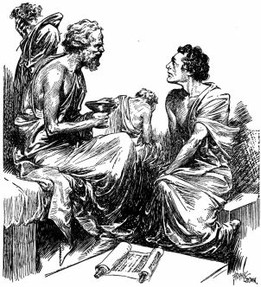 This first speech is relatively short. Phaedrus begins his encomium by stating that Eros is the oldest of the gods.
This first speech is relatively short. Phaedrus begins his encomium by stating that Eros is the oldest of the gods.
 At this point in the proceedings, Aristophanes is scheduled to speak, but has an attack of the hiccups and is replaced by Eryximachus, a physician.
At this point in the proceedings, Aristophanes is scheduled to speak, but has an attack of the hiccups and is replaced by Eryximachus, a physician.
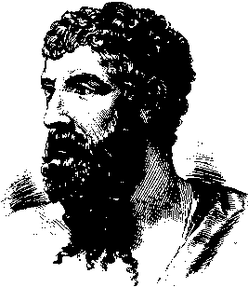 Newly recovered from his hiccups, Aristophanes, the most popular comic playwright of his time, begins, what he claims will be, an absurd speech.
Newly recovered from his hiccups, Aristophanes, the most popular comic playwright of his time, begins, what he claims will be, an absurd speech.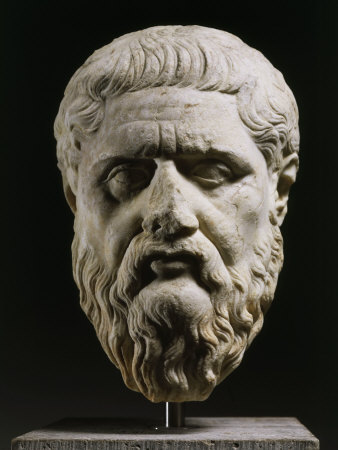
 Socrates, the oldest member of the group, naturally takes issue with Agathon’s eulogy and proceeds to refute his suggestions with a clever line of questioning.
Socrates, the oldest member of the group, naturally takes issue with Agathon’s eulogy and proceeds to refute his suggestions with a clever line of questioning.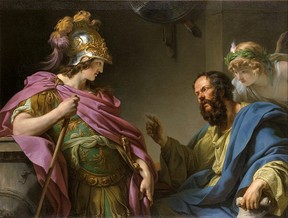 Alcibiades begins his encomium by teasing the previous speaker. He compares Socrates to a statue of Silenus and Marsyas the satyr.
Alcibiades begins his encomium by teasing the previous speaker. He compares Socrates to a statue of Silenus and Marsyas the satyr.

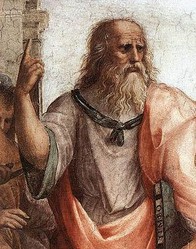

 How to Avoid College Debton 07/31/2014
How to Avoid College Debton 07/31/2014
 Was Charlotte Bronte Jealous of her Sister Anne?on 07/15/2014
Was Charlotte Bronte Jealous of her Sister Anne?on 07/15/2014
 Whose Side is Cancer Research UK on?on 07/06/2014
Whose Side is Cancer Research UK on?on 07/06/2014
 A Plot Summary of Electra by Sophocleson 07/05/2014
A Plot Summary of Electra by Sophocleson 07/05/2014



Comments
Hello, Kari. Thanks for stopping by. I think love and relationships (and the nature of them), will always be relevant, because like many of the issues covered in philosophy and great literature, it's universal and timeless. The Symposium is interesting for many reasons, and, of course, history and culture are big ones. You're right, it's a shame they're not covered more in classes on the text.
I first heard of The Symposium when someone told me that Aristophanes's speech was the basis for the song The Origin of Love in Hedwig and the Angry Inch. When I had a chance to do so, I read The Symposium and did a report on it in Philosophy 101. I agree with you as to its uses, and I wish that the social constructs and historical ideals in it were covered in more classes, seeing as they are still somewhat relevant in modern society.
Oh, he's probably rehashing the Symposium with Aristotle and Alcibiades, without a doubt. I had some real characters as lecturers, genuinely polite men with endless patience for us students. Not all of today's lecturers are so good, although I've worked with those from both sides. Oddly enough, the engineers and medics so far seem to be better than the fine arts staff. Strange, given my own degree is in Classics.
Thanks for sharing. Sounds like a great chap! Such a shame he didn't get to enjoy a much deserved (and what I'm sure would have been very productive) retirement. Wonder what kind of discussions he's been having with Plato...
Philosophy lectures as they should be, small intimate gatherings based on the Symposium, WiseFool. http://www.independent.co.uk/arts-ent... is the obit of my lecturer, Professor Saunders. Wonderful fellow, left us far too early and should have by rights enjoyed a long and relaxing retirement with his films and steam trains.
Thanks, Kathleen. Very glad you enjoyed it.
Oh, WordChazer, good memories indeed! Sounds wonderful. If we get our own personalised versions of heaven, mine will be very close to your philosophy 'lectures'.
Plato. Happy memories of university Philosophy seminars. Can't call them 'lectures' because they were cosy gatherings held in the Head of Department's amazing office, a place lined with books and holding surprises such as hidden drawers from which he would produce all manner of goodies to offer his students.
Love this article! Profound ideas presented in a way I could understand, and with humour.